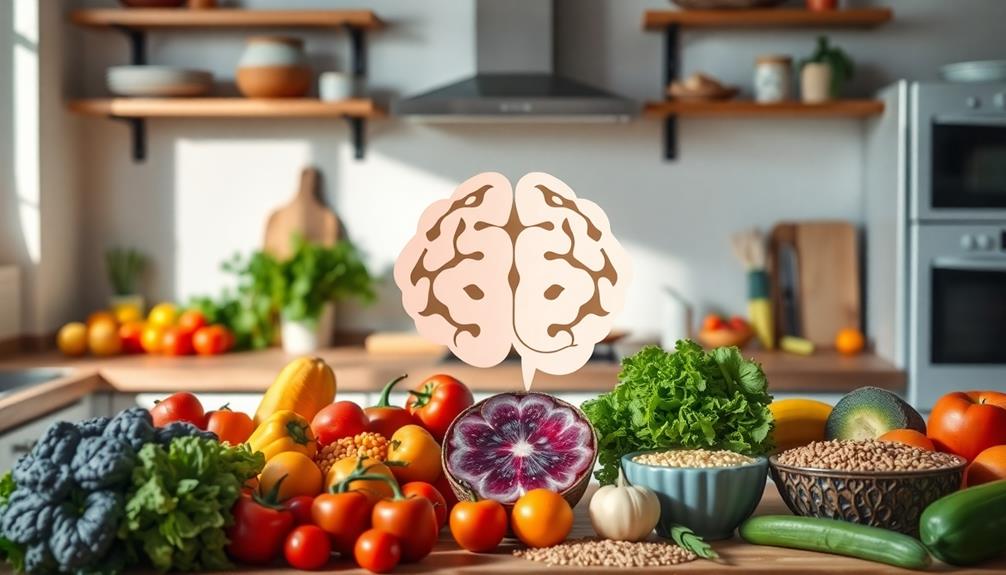Your eating habits play an essential role in your cognitive function as you age. Diets rich in whole foods, like the Mediterranean diet, can enhance brain health and lower dementia risk. These diets provide antioxidants and healthy fats, helping to combat oxidative stress in your brain. Conversely, high saturated fat and refined carbs can negatively impact cognition. Ensuring adequate protein intake is also key for maintaining memory function. Adopting healthier eating patterns can greatly improve your cognitive health. If you're curious about specific diet strategies and other lifestyle changes that support brain function, there's plenty more to explore.
Key Takeaways
- Dietary patterns, such as the Mediterranean and DASH diets, improve cognitive function in older adults through antioxidants and anti-inflammatory effects.
- Nutritional deficiencies, particularly protein and micronutrient shortages, significantly elevate the risk of cognitive decline and dementia.
- Adequate protein intake supports neurotransmitter production, enhancing memory function and reducing Alzheimer's disease risk.
- Omega-3 fatty acids found in fish are linked to a reduced risk of all-cause dementia, highlighting the importance of healthy fats.
- Regular physical activity combined with a balanced diet promotes neurogenesis and cognitive health, further supporting mental sharpness in older adults.
Impact of Diet on Cognition

Diet plays an essential role in shaping cognitive health as we age. For older adults, adopting a balanced diet can greatly impact cognitive function and reduce the risk of cognitive decline. The Mediterranean diet, rich in antioxidants and anti-inflammatory components, has been linked to improved cognitive outcomes.
Incorporating seasonal vegetables into meals, such as those found in Nettle and Potato Soup, can further enhance cognitive benefits. When you increase your intake of vegetables and mushrooms, studies reveal a protective effect, showing an odds ratio of 0.415 for better cognition.
Moreover, adequate protein intake is vital since malnutrition can lead to cognitive decline. High-protein diets can offer protective benefits against Alzheimer's disease, emphasizing the importance of dietary patterns.
Don't overlook omega-3 fatty acids found in fish; they're associated with lower all-cause dementia risk, highlighting how the right dietary fat composition supports cognitive health.
Incorporating these elements into your daily meals can make a difference. By focusing on a diet that includes antioxidants, sufficient protein, and omega-3s, you can contribute to maintaining your cognitive function and potentially stave off dementia risk.
Making mindful choices in what you eat today can help improve your cognitive health tomorrow.
Nutritional Risk Factors for Dementia

Nutritional deficiencies can considerably heighten the risk of dementia in older adults. Adequate protein intake is essential for cognitive health, as protein malnutrition is a recognized risk factor for cognitive decline.
Additionally, deficiencies in essential micronutrients like Vitamin A, iodine, and iron can critically impact brain health, particularly in aging populations. Including nutrient-dense foods such as Red-Braised Pork Belly can provide essential proteins and healthy fats that support cognitive function.
To support cognitive function, you should focus on dietary patterns rich in antioxidants, omega-3 fatty acids, and other essential nutrients. Research suggests that high intake of antioxidants, such as vitamins E and C, correlates with improved memory and cognitive performance.
On the flip side, diets high in saturated fats and refined carbohydrates can negatively affect cognitive outcomes, reinforcing the importance of healthy dietary choices.
Moreover, a balanced diet that includes plenty of fruits, vegetables, and healthy fats can considerably reduce the risk of dementia. By paying attention to these nutritional factors, you can help maintain your cognitive health as you age.
Prioritizing nutrient-rich foods not only supports brain health but also promotes overall well-being in older adults. Make conscious choices to protect your mind and enhance your quality of life.
Dietary Patterns and Cognitive Health

Numerous studies highlight the strong connection between dietary patterns and cognitive health in older adults. The Mediterranean and DASH diets, which emphasize whole foods, are linked to improved cognitive function and a reduction in neurodegenerative risks. These diets are rich in antioxidants and anti-inflammatory components, which play a vital role in maintaining brain health and potentially mitigating cognitive decline.
Here's a quick overview of some beneficial dietary patterns:
| Dietary Pattern | Key Components | Benefits for Cognitive Health |
|---|---|---|
| Mediterranean Diet | Fruits, vegetables, fish, nuts | Reduces dementia risk, enhances cognition |
| DASH Diet | Whole grains, lean proteins, nuts | Improves cognitive performance |
| MIND Diet | Leafy greens, berries, nuts | May slow cognitive decline |
| Nordic Diet | Fatty fish, root vegetables | Supports overall brain health |
Research from randomized controlled trials supports the idea that specific dietary interventions can enhance cognitive function in older adults. By adopting these dietary patterns, you can take proactive steps toward better cognitive health and a lower risk of cognitive decline.
Role of Protein in Brain Function

As you age, the role of protein in your diet becomes essential for maintaining cognitive function.
Adequate protein intake not only supports neurotransmitter production but also helps protect against cognitive decline. Incorporating sources like lean meats, dairy, legumes, and fish can greatly enhance your brain health.
Additionally, traditional dishes like Caldeirada and seafood options provide rich protein sources that can be beneficial for cognitive function as well.
Protein Intake and Cognition
When it comes to maintaining cognitive function as we age, protein intake plays a fundamental role that shouldn't be overlooked. Adequate protein is necessary for older adults, as protein malnutrition has been identified as a significant risk factor for cognitive decline.
Research indicates that diets rich in protein, such as the Mediterranean diet, may offer protective benefits against Alzheimer's disease by mitigating risks associated with amino acid imbalances. Traditional Italian dishes, such as braised beef in Barolo wine, aren't only delicious but also provide necessary protein that supports brain health.
The importance of amino acids can't be overstated. Metabolomics studies show that plasma free amino acid (PFAA) levels are essential for maintaining physiological equilibrium, a cornerstone of brain health.
Long-term protein deficiency can lead to neurodegenerative changes, making it important for older adults to monitor their dietary habits closely.
Sources of Dietary Protein
Protein is an essential nutrient for maintaining brain function, especially in older adults. Adequate protein intake plays a significant role in supporting cognitive function and can help prevent cognitive decline.
Research shows that protein malnutrition is a considerable risk factor for memory issues and may even increase the risk of Alzheimer's disease. Incorporating diverse protein sources, such as those found in dishes like Mushroom Masala or lentils, can enhance your diet and provide essential nutrients beneficial for brain health.
To guarantee you're getting enough dietary protein, focus on reliable sources such as lean meats, fish, eggs, dairy products, legumes, and nuts. These foods not only provide necessary amino acids but also contribute to better memory function and overall cognitive health.
Incorporating a variety of these dietary sources into your meals can help balance your amino acid composition, which is essential for peak brain performance.
Studies suggest that long-term imbalances can reflect or contribute to cognitive impairment, underscoring the importance of nutrition in maintaining mental clarity as you age.
Neuroprotective Foods for Aging Adults

Incorporating neuroprotective foods into your diet can greatly impact cognitive health as you age. A diet rich in fruits and vegetables provides essential antioxidants that help reduce neurodegenerative risks and support cognitive function in older adults.
Traditional Japanese dishes like dorayaki, which offer natural sweetness and can be made with nutritious ingredients, can be a delightful addition to your diet. Focus on incorporating omega-3 fatty acids, particularly from fish, as these nutrients are linked to lower dementia risk and improved memory function.
Following dietary patterns like the Mediterranean diet proves beneficial, emphasizing whole foods and balanced nutrition. This diet not only includes healthy fats from olive oil but also promotes high-protein options that can protect against Alzheimer's disease.
Specific combinations of vegetables and even mushrooms have been shown to correlate with improved cognitive outcomes, making them essential neuroprotective foods.
Lifestyle Changes for Cognitive Prevention

To boost your cognitive health, consider how your dietary patterns can impact your brain. Incorporating traditional foods such as Kue Putu and Dadar Gulung can provide essential nutrients that support brain function.
Additionally, incorporating physical activity and practicing mindfulness can also play a vital role in maintaining mental sharpness as you age.
Dietary Patterns Impacting Cognition
The connection between dietary patterns and cognitive health in older adults is becoming increasingly clear. Research shows that adopting specific dietary patterns, like the Mediterranean and plant-based diets, can greatly reduce dementia risk and enhance cognitive function.
For instance, a study found that higher consumption of vegetables and mushrooms correlates with better cognitive performance, highlighting the role of these foods in combating cognitive decline. Additionally, incorporating fun and festive foods, like Graveyard Taco Dip, can make healthy eating more appealing while still focusing on cognitive health.
The FINGER trial indicates that older adults aged 60-77 who embraced a multidomain lifestyle intervention, which included specific dietary guidelines, experienced a remarkable 25% improvement in cognitive function. This evidence suggests that integrating these dietary patterns can be vital for cognitive health.
Antioxidants, abundant in fruits, nuts, and vegetables, are believed to help mitigate oxidative stress in the brain, potentially lowering the risk of cognitive decline.
Moreover, adequate protein intake is essential; studies show it correlates with improved memory function. By focusing on these dietary patterns, you can take considerable steps toward maintaining your cognitive health and reducing the risk of dementia as you age.
Importance of Physical Activity
Regular physical activity plays an essential role in maintaining cognitive health as you age. Engaging in regular exercise boosts cognitive function, helping older adults enhance memory and processing speed, ultimately delaying cognitive decline. Just 150 minutes of moderate-intensity aerobic exercise each week can markedly lower your risk of dementia and cognitive impairment.
Additionally, incorporating a healthy diet rich in diverse culinary traditions, such as Asian Cuisine, can further support brain health and cognitive function.
Exercise promotes neurogenesis and increases brain-derived neurotrophic factor (BDNF), which is vital for learning and memory, contributing to overall brain health. It's not just aerobic exercise that matters; resistance training also positively impacts cognitive function. Older adults who participate in strength training often report better cognitive performance compared to those who don't.
A combination of aerobic and resistance training is recommended for best cognitive health benefits, as this approach addresses various aspects of physical fitness that support brain function.
Mindfulness and Cognitive Health
In recent years, mindfulness has emerged as a powerful tool for enhancing cognitive health in older adults. By engaging in mindfulness practices such as meditation and focused breathing, you can improve attention, memory, and cognitive flexibility, potentially mitigating cognitive decline.
Additionally, incorporating traditional dishes like Muamba De Galinha into your diet can provide essential nutrients that support brain health. Regular mindfulness activities lead to significant stress reduction and lower anxiety levels, both known risk factors for cognitive impairment and dementia.
Older adults who practice mindfulness often report enhanced emotional regulation and improved overall mental well-being, which contribute to better cognitive health. Incorporating mindfulness into your daily routine can also increase neuroplasticity, a vital factor that supports cognitive function and resilience against age-related decline.
Additionally, mindful eating emphasizes awareness of your food choices and eating habits. This practice encourages healthier dietary patterns, further supporting cognitive function in older adults.
Frequently Asked Questions
How Does Diet Affect Cognitive Function?
Your diet plays an essential role in your cognitive function. Consuming a variety of nutrient-rich foods helps enhance memory and mental clarity, while deficiencies can impair cognitive abilities. Make healthier choices for better brain health.
What Causes Cognitive Decline in the Elderly?
Cognitive decline in the elderly resembles a withering garden, where neglect leads to fading blooms. Factors like age, genetics, and health conditions contribute to this decline, affecting memory, thinking skills, and overall mental sharpness.
What Affects Cognitive Function in Older Adults?
Cognitive function in older adults is influenced by various factors, including lifestyle choices, physical activity, social engagement, and mental stimulation. Prioritizing these aspects can help maintain and enhance your cognitive health as you age.
Which Cognitive Function Typically Declines With Age?
As time marches on, you might notice your memory slipping. Typically, episodic memory, processing speed, attention, and executive function decline with age, making it harder to recall events, solve problems, or multitask effectively.
Conclusion
To sum up, if you think you can munch on potato chips and still maintain sharp cognitive function, think again! Embracing a diet rich in neuroprotective foods isn't just a suggestion; it's a necessity for aging gracefully. So, swap that soda for some green tea, and for heaven's sake, don't forget your leafy greens! After all, who wouldn't want their golden years to be filled with clarity rather than confusion? You've got a brain; why not feed it well?










